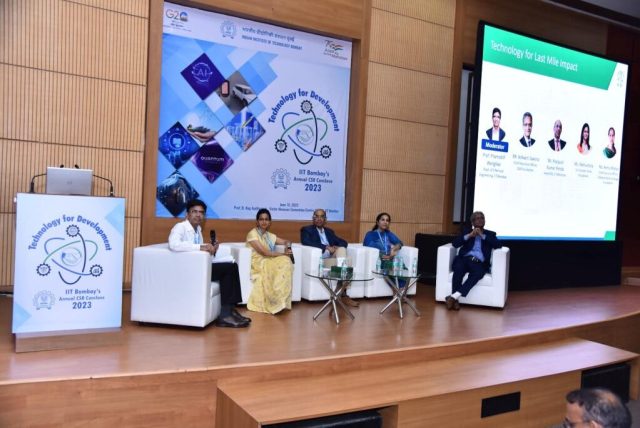Home
Press Release IIT Bombay’s Annual CSR Conclave 2023 showcases pathbreaking initiatives towards technological self-reliance
IIT Bombay’s Annual CSR Conclave 2023 showcases pathbreaking initiatives towards technological self-reliance
Mumbai, India: Ranked first in India and 47th globally [Quacquarelli Symonds (QS) World University Rankings by Subject for 2023] in Engineering and Technology, IIT Bombay is committed to developing technologies that will contribute to nation-building. The academic programs and research initiatives of IIT Bombay are focused on fuelling areas of strategic national importance such as defence applications, quantum technologies, Artificial Intelligence and Cybersecurity; driving economic development through the growth of critical industries such as semiconductors, green energy, electric vehicles, drugs, and pharmaceuticals and creating last-mile impact through technologies in SDG-aligned sectors such as healthcare, sanitation, clean water, and education technologies.
IIT Bombay is keen to partner with corporates that are committed to making a difference through their CSR efforts. The partnerships will fuel national priorities and help the country leverage technology towards achieving self-reliance and elevating its economic standards.
The second edition of IIT Bombay’s Annual CSR Conclave 2023 held on June 16, 2023, on campus, was based on the theme “Technology for Development” towards addressing social, economic, industrial and environmental challenges in India. The event provided a platform for meaningful corporate engagement and collaboration with the Institute through the route of CSR funding. The Annual CSR Conclave has emerged as a flagship event, with attendance from over 200 corporates and CSR heads.
While delivering the keynote address at the conclave, Chief Guest Dr. Ganesh Natarajan, Chairman, 5F World, and Chairman of the Board, Honeywell Automation India Limited said, “I believe that emerging technologies including virtual reality and generative artificial intelligence have a significant role to play in the betterment of society. Carefully designed processes and social interventions, powered by digital technologies, will accelerate social transformation. It is imperative that the best corporations partner with outstanding technology institutions to develop this architecture”.
The panel discussions deliberated on leveraging technology for ‘Strategic National Imperatives’ and ‘Industrial and Economic Development and Last-Mile Impact’.
The first panel on ‘Strategic National Imperatives’ comprised illustrious personalities such as Mr. Anil Shama, Head, Corporate Incubation, Tata Consultancy Services and Dr. Shridhar Shukla, Co-Founder, Chairman, KPOINT Technologies.
“As we strive towards technological self-reliance, it is crucial for industry to partner with exceptional technology institutions like IIT Bombay. By combining our expertise and resources, we can leverage emerging technologies such as semiconductors and quantum computing amongst others to drive social transformation and uplift our society,” opined Mr. Sharma.
The second panel on ‘Industrial and Economic Development’ saw participation by eminent persons including Mr. Gajanan V. Gandhe, Country Head & Vice-President, Dana India; Mr. Pankaj Doshi, Head of Predictive Science, Pfizer; Mr. Rajeev M. Pandia, Independent Director, various chemical companies and Past President, Indian Chemical Council and Mr. Vinay Malhotra, Managing Director, Schlumberger India.
The third and final panel on ‘Last Mile Impact’ witnessed interesting deliberations by renowned panelists including Mr. Ashwini Saxena, Chief Executive Officer, JSW Foundation; Mr. Pratyush Kumar Panda, Head ESG, LTIMindtree; Ms. Rekha Koita, Co-Founder, Koita Foundation and Ms. Rema Mohan, CEO, National Stock Exchange Foundation.
Mr. Ashwini Saxena said, “Technology has always been an enabler and an equaliser when it comes to connecting the people at the far end with opportunities to address their needs. Technology also has the power to unlock latent needs to explicit ones and open new vistas of their potential. However, technology needs to be coupled well with managerial inputs and community connects so that technology too can be enabled. Without entrepreneurial support, technology may have its limitations in terms of creating a ‘public good’ ”.
The showstopper of the conclave was the “Tech Showcase” comprising two segments – project presentations and an exhibition. Professors and students had the opportunity to exhibit their projects, which demonstrated the use of technology for addressing critical issues such as healthcare, education, agriculture and environmental sustainability. The exhibition provided corporate and CSR leaders with an opportunity to interact with the students and professors involved in the technology initiatives.
The conclave hosted an exclusive award ceremony, recognising and honouring corporates who have made significant CSR contributions to IIT Bombay and collaborated with the Institute on high-impact initiatives.
Commenting on the role that partnerships between educational institutions and corporates can play in nation-building, Prof. Subhasis Chaudhuri, Director, IIT Bombay said, “Education institutions like IIT Bombay are proud to embrace Corporate Social Responsibility (CSR) funding as a powerful means to drive positive change. By channelling CSR funds into research initiatives, we can leverage the expertise and innovation of our students and faculty to develop technologydriven solutions that address critical societal challenges”.
The conclave was successful in highlighting the critical role that corporates can play in collaborating with educational institutes towards nation-building and enabling a high-tech ecosystem in the country. The corporates in attendance were given detailed insights into the various ways they could explore collaborating with IIT Bombay, an ‘Institute of Eminence’, towards establishing world-class R&D centres and empowering India in its next phase of technology-led growth.
Disclaimer: This media release is auto-generated. The CSR Journal is not responsible for the content.













